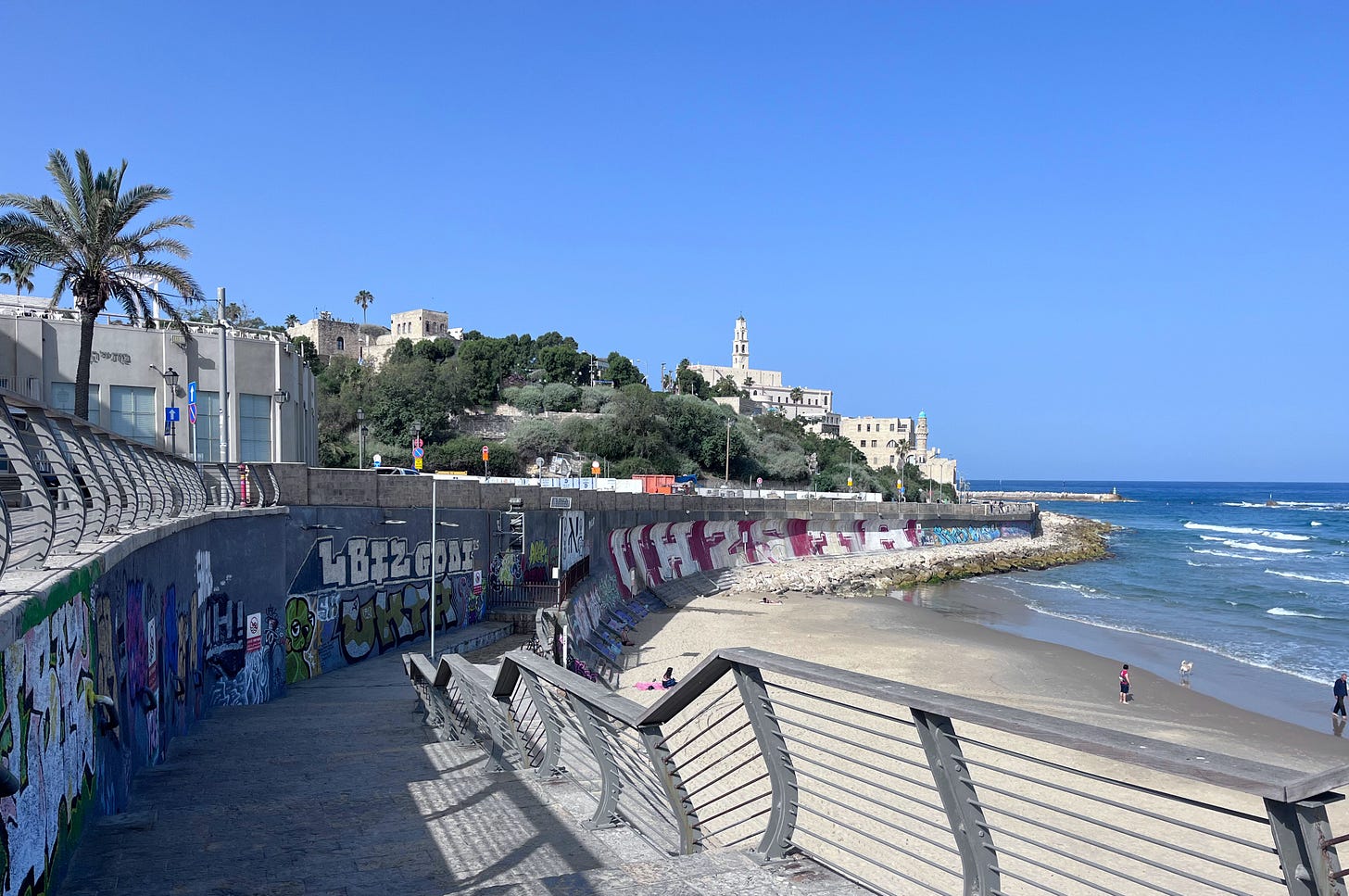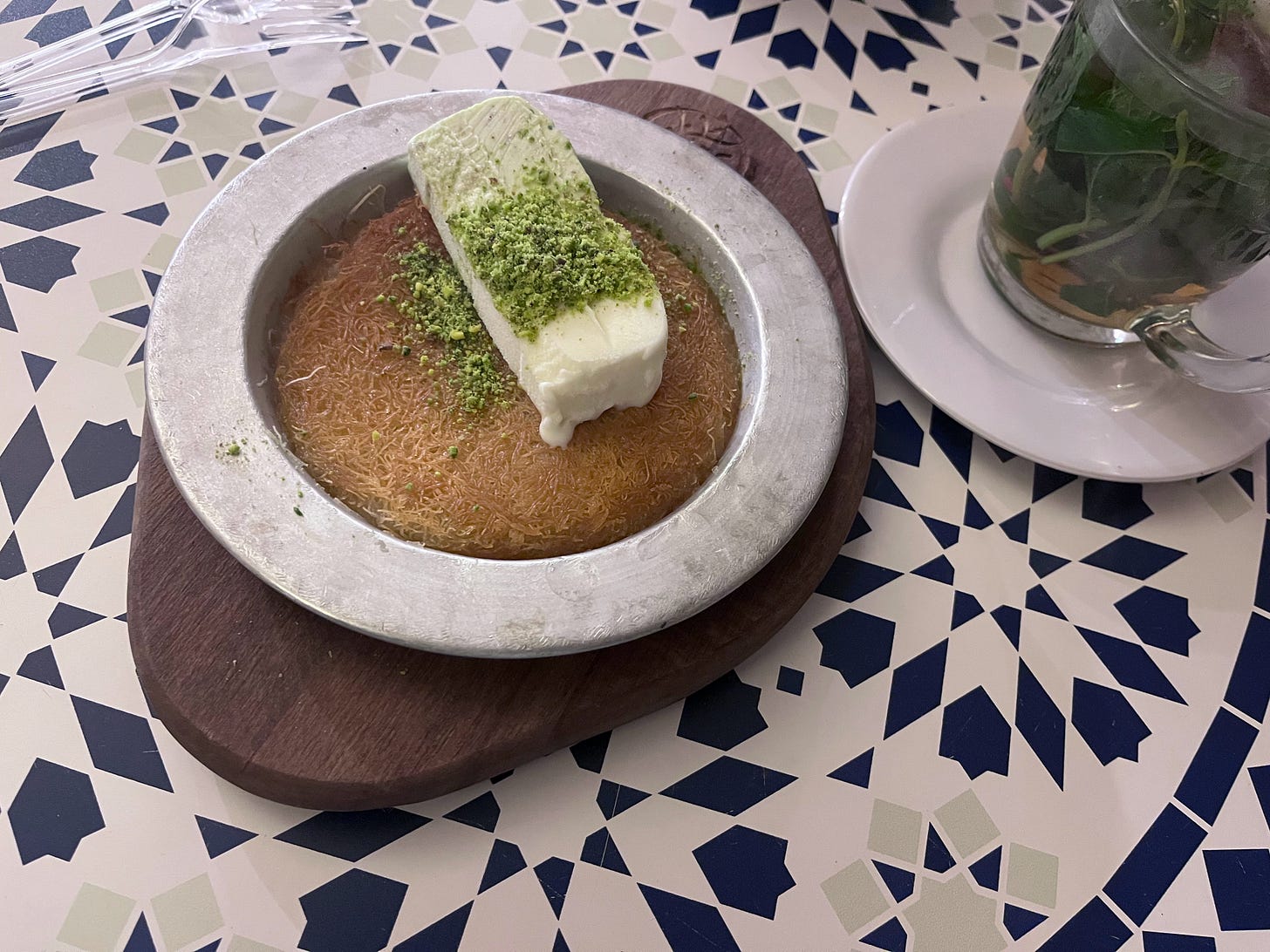Friends with Words is a newsletter about language, culture, and identity, created by a Russian-born, Israel-based writer, linguist, and single mom.
It's for people who believe that curiosity can heal the world or, at least, make it a slightly less horrible place.
Last week, I gave myself a gift for the Israeli Independence Day: a two-day vacation in Jaffa, all by myself.
I didn’t have to go to Jaffa. I’d go anywhere in the Tel Aviv area. I just picked the cheapest Airbnb I could find. It was a tiny room that could fit only a bed, a mini-fridge at the foot of the bed (which I kept kicking in the middle of the night because at 5”2, I was too long for the bed), and a tiny bathroom behind a curtain that hung 25 cm from the bed.
I had a choice between this place and a spacious room in a shared apartment. I almost booked the latter, but the reviews said that the owner of the place, Sharon (“the soul of the place”), prepared your breakfast every morning and watched TV in the other room the rest of the time.
I didn’t care for a friendly lady to make me breakfast every morning, when I came here to be by myself, so I booked the tiny room instead.
Instead of Sharon, there was a grumpy Ukrainian woman named Valentina who reminded me to turn off the light every time I stepped into the corridor, watched loud Russian TV in what counted as her separate unit, and complained about flavorless Israeli cucumbers and about how everybody is so fat in Jaffa compared to Dnepropetrovsk.
But on the bright side, when I lay in bed, I could easily stretch my arm and pat my very own private toilet.
Sirens and fires
It would have been the perfect relaxing vacation if it hadn’t been fraught with a rollercoaster of events the day before.
The day before Independence Day is Remembrance Day for fallen soldiers (Yom HaZikaron). There are two sirens on Remembrance Day (one the night before and one in the morning) during which the entire country stands still.
In Hebrew, the word for these sirens (tsfira) is different from the word for the rocket alert siren (az’aka). But the sound is similar enough that every year, parents have to remind children that it’s not the kind of siren where you have to drop everything and run to the safe room, but the kind where you have to drop everything and freeze in place for a minute.
Still, when the first Remembrance Day tsfira sounded at 8 pm on Tuesday, Maya instinctively ran to the safe room. I ran towards her, and we met in the middle and stood there, frozen in a hug, for a minute.
The pause button
During the second tsfira, the next morning, I was already in Tel Aviv. I prefer to be outside during these sirens because it is awe-inspiring to watch the Israeli public, across political and religious divisions, get up like one and stand still for a minute.
Just to make it clear, it is impossible to get a group of more than two Israelis to be still and quiet for an entire minute at any other time.
I remember how, when my son went to primary school in the UK, parents were sometimes invited to the school assembly in the church that the school was attached to. Parents would sit up there in the balconies and wait for the kids to come in on the main floor.
At some point, you’d look over the balcony railing and see the entire school — six grades, 180 kids, already sitting there in neat rows: they came in without making a single sound.
That is physically impossible in an Israeli school, and any educator who would attempt to organize this would not only fail miserably but would be seen as encroaching on the kids’ personal freedom.
So it is somewhat reassuring that we can do this when we put our mind to it, and also, that at least for one minute every year, the whole country (or at least the vast majority of it) agrees on what is to be done that particular minute.
When the tsfira started at 11 am, I was in a busy coffee shop. All the chatting people went silent, stood up, and froze.
A big dog kept barking nervously. A tiny dog looked up at all the frozen humans, confused, not making a sound but wagging his tail cautiously now and then, waiting for something to happen. A baby in someone's arms kept trying to take his frozen mom’s glasses off her face.
When the minute ended, everybody sat down, and the chatter resumed as if someone had pressed a “pause” button on the universe and now released it.
the transition
The transition between Remembrance Day (sad) and Independence Day (supposed to be joyful) is not an easy one.
This year, because I was outside, I was curious to see how that transition would play out in the world. How does sadness flow into joy? Is there a clear boundary between the two, or does one flow into the other gradually, like day turning into night?
To the extent that joy could be had at all this year, when things are still so heavy.
But joy was not to be had this year, not only because of the war and the hostages, but also because of the wildfires that were now raging in the center of the country. So the sadness turned into low-level anxiety (or panic, depending on where you were).
The fires were very close to my home. Villages within a seven-minute drive from us got an evacuation order. The national park right outside of the city was burning (it burned almost to the ground). My kids weren’t at home, so I was mostly worried about my pets and the friends whom I entrusted with the care for my pets and who would now have to evacuate them if the evacuation order came.
So much for releasing my inner control freak: you go away for the first time in two years, and the place goes up in flames.
keep walking
But since there was not much I could do, I just kept walking until I arrived in Jaffa, where the smell of smoke was drowned out by the smell of hookah.
Jaffa is part of what is today known as Tel-Aviv-Jaffa. Tel Aviv started as a neighborhood of Jaffa, but now Jaffa is the southernmost neighborhood of Tel Aviv.
Jaffa is older than Jerusalem (Old Jaffa is over 4000 years old).
But the way I like to look at it — the combination of the ancient buildings and graffiti-covered walls, and the general relaxed seaside vibe — it is that if Jerusalem and Tel-Aviv had a baby, it would be Jaffa.
It’s easy to find Arabic speakers here: about one-third of Jaffa’s residents are Arabs.
In one restaurant, a waiter brings me my order and asks: “Inti Arabi walla taalamt Arabi?” (“Are you Arab or did you learn Arabic?”) I’m flattered, but there is no reason to get too excited: I had only said like three words to him. I say “Ana bat’3allam” (“I’m learning”).
I don’t feel at all confident speaking yet, but I’m sure glad it looks like I do.
But that comment also makes my life more difficult because now I feel that I have to live up to that high standard. When I have to go to the bathroom, I hesitate to ask where it is because I’m not 100% sure what the right word is.
I know the word hammam, but it can be translated as either “shower” or “bathroom.” There are other words, but I’ve never heard them used. This is dangerous territory. I don’t want to sound like I want to take a shower in a restaurant but I also don’t want to sound like Borat and say something that may sound like “shitting place.”
The dizzying variety of English words for ‘bathroom’
I feel like the ‘bathroom’ territory is a minefield in any language.
Even in English.
In the US, you say ‘restroom’ or ‘bathroom’
In Canada, you say “washroom.”
In the UK, you say “toilet” (or “loo” “Loo” is my personal favorite.)
Use the wrong word in the wrong place, and people will look at you funny.
Once, a fellow Canadian academic, who was at a conference in the States, inquired about a “washroom” in a restaurant, and people kindly explained to her: “You cannot wash your clothes here, honey.”
(To their defense, most academics dress like homeless people, so I can’t blame them for thinking she was looking for a place to wash her clothes.)
Knafeh for supper
The coolest thing is when you just speak and people don’t make a big deal about it.
“Bukra maftuh?” (“You’re open tomorrow?”) I ask in a knafeh place.
“Aw” (“Yes”)
Yes, I think it’s ok to eat knafeh — a delicious warm dessert made of (goat) cheese and shredded phylo dough and obligatory optional pistachio ice-cream — for dinner two days in a row.
Friends with Words takes many hours a week to create. If you enjoy my writing, consider making a one-time or monthly donation ☕
If you’re a writer on Substack, consider recommending Friends with Words to your readers (Go to Dashboard>Recommendations>Manage>Add recommendation)







In Lithuanian, the cutesy way of saying "to go to the bathroom" is literally "to visit the gnomes". Thought you might find it funny.
Hilarious! As usual:)